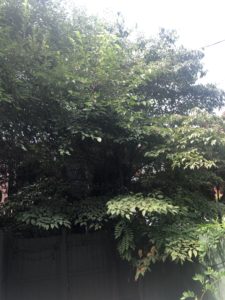Like humans, trees also need oxygen and nutrients to be able to live. The roots anchor the plant in the ground while absorbing water and minerals. To enable plant growth, the root system should be well-developed. Without a strong root system, your tree would not be able to stand tall and thrive.
What Are Feeder Roots?
When you think about tree roots, you immediately think of a large root system down into the ground. That is true with trees that have long taproots. However, most tree roots grow out horizontally from the tree in the top 6 to 18 inches of soil. These types of roots are called feeder roots. The small fibrous feeder roots grow where there are water and nutrients.
Since most roots are located underground, it’s easy to forget that they require just as much attention as other parts of the tree. In this blog post, we have listed down some helpful tips to keep your tree’s roots healthy.
Invest in Organic Mulch
Materials like pine straw, leaves, wood, and bark chips can be used as mulch. These organic materials are applied to the soil surface around the tree. When you lay mulch, you will be able to provide nutrients and reduce weeds.
In addition, mulches protect the roots’ surface by retaining moisture. This means that the roots are cooled down in the summer and protected from the cold during the winter months.
As a rule of thumb, you need to spread a mulch of 3 to 4 inches underneath the mature tree to protect the roots. Just make sure to keep mulch away from the trunk because it might attract pests.
If you would like to convert the remains of your tree into natural wood chips, you may reach out to a company that offers wood chipping services.
Avoid Cutting the Roots
Cutting tree roots can be quite stressful for them. Whenever you cut tree roots, familiarize yourself with the root system. Avoid cutting too many roots, especially the bigger ones.
Doing so will leave them vulnerable to insect infestations and diseases. This can lead to death or irregular development for several years to come. You should use power equipment carefully under the supervision of a tree expert.
Water Your Tree
Regardless of age, trees need to be watered regularly. Deep watering is the key during dry months when water evaporates quickly. When it’s the middle of fall, you need to water the roots one last time. This will help the trees survive during the winter months.
When the winter rolls in, the cold air will cause the soil to be dry and dehydrated. If the ground is not frozen, you may apply water at or near the dripline. To understand the water needs of your trees, feel free to check out our tree watering guide.
Let the Roots Breathe
Yes, roots need water to grow and flourish. But anything too much is bad. Overwatering causes your soil to be waterlogged. When you have heavily drained soil, oxygen won’t be able to pass through. The longer the oxygen supply is cut, the bigger the root damage.
In order to allow oxygen to reach your tree’s roots, you need to let the soil dry out for several days. This will prevent the roots from being suffocated.
Protect the Tree Roots
Whenever you have improvement or renovation projects at home, remember to protect your trees. The heavy equipment, materials, and foot traffic can harm the roots. Soil compaction prevents oxygen and water from reaching the tree roots.
Moreover, compacted soil can lead to water runoff and erosion. Since soil compaction is irreversible, being proactive is the only solution. If your construction or landscaping activities are unavoidable, you may perform these during the late fall and winter. These seasons are less stressful for the trees.
Install Tree Protection Fences
Physical barriers for trees will help people, animals, and vehicles from damaging your tree roots. You may use highly visible orange plastic mesh or chain link fencing. Install the fence properly and extend it out to the dripline of the tree or slightly beyond.
If you don’t want to buy temporary fencing, you can build your own using stakes and rope. A six-inch layer of coarse mulch or wood chips beneath the dripline can also serve as a protective barrier.
Avoid Using Fertilizers Near the Feeder Roots
Since feeder roots are found in the upper few inches of the soil, they can easily absorb anything, even chemicals. Be careful in using fertilizers, pesticides, and herbicides. Anything with de-icing agents can potentially harm your tree and shrubs.
Perform Bed Preparation Properly
If you are planting new trees, the soil should be prepared for seeding. Bed preparation involves tilling or turning the soil down about 8 inches. When you break up the soil, it’s a lot easier for the roots to grow. During the planting process, dug holes that are two to three times as wide as the root ball.
In return, it encourages a favorable soil environment and plant growth. Successful establishment of tree seedlings can promote a strong root system and better oxygen flow.
Consult a Certified Arborist
Roots are one of the most important parts of your trees. They work hard to keep the trees strong and anchored onto the ground. If you are having any trouble with tree roots, it’s always best to hire a reliable tree care company.
At Midstate Tree Service of Harrisburg, we provide a wide range of services like tree removal, trimming, stump removal, and grinding. Schedule an appointment with our tree experts today!




